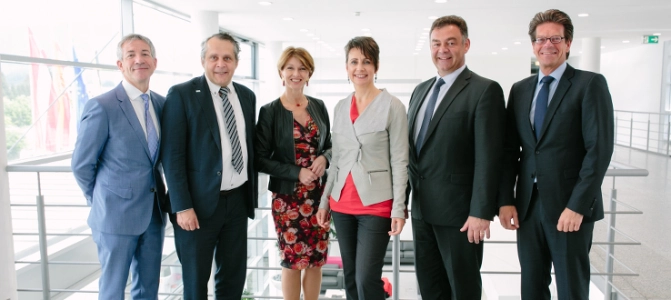
© Infineon
Business |
SemI40 strengthens Europe’s economy with 'learning factory'
The research project SemI40 (“Power Semiconductor and Electronics Manufacturing 4.0”) led by Infineon Austria was launched yesterday.
In this project 37 partners from five countries will carry out research into further developing autonomous factories. The common goal is the next stage in the development of Industry 4.0 applications. With a volume of EUR 62 million, the research project is one of the largest Industry 4.0 projects in Europe.
“The European project will make a major contribution to keeping and strengthening production and jobs in Europe, thus contributing to a stronger business and technology location,” said Sabine Herlitschka, Chief Executive Officer of Infineon Austria. “From this cross-border cooperation all partners will profit and generate competitive advantages.” Infineon Technologies AG will contribute substantial know-how to the project thanks to its pioneering role in Industry 4.0 in Austria. The Pilot Room Industry 4.0 in Villach offers ideal conditions for trying out new manufacturing processes in live operation.
The focus is on two fields “made in Europe”
SemI40 will focus on “smart production” and “cyber-physical production systems” in the next three years with secure data traffic playing a key role within and outside factories. In this regard the project’s aim is to develop processes that ensure secure communication between globally connected systems with different features – for example, in terms of age, operating system or interfaces. Potential impacts on production should be drastically reduced thanks to early identification of risks from malware.
Another major focus is the development of dynamic simulations. They enable production to be planned more exactly and efficiently, as well as quality, capacity utilization and cycle times to be improved.
Decisions in the production process are often routine ones and based on defined patterns. In future, the systems should increasingly make these decisions themselves – automatically and with a constant level of quality. In doing so, the people are relieved of exhausting routine giving them more time for more complex tasks.
Factories not only learn at all times, but must also be adaptable: To be able to respond faster to changes along the entire supply chain, production processes must adapt more flexibly to changes – in the configuration, flow of goods or customers’ order behavior, for example. The advantages are energy savings and more efficient use of resources overall.
Social impact on the jobs of the future
SemI4.0 will also research the social impact on the jobs of the future: Industry 4.0 will change work functions and qualifications of employees in the long run. The requirements of future job profiles need to already be taken into account now. They increasingly entail system-oriented working and necessitate training and qualification measures that reflect the changes in production processes. As a result of these further developments, SemI40 will help secure more than 20,000 jobs at the companies involved. The project partners have a total of around 300,000 employees worldwide.
Infineon heads further European research project
A further European innovation project headed by Infineon Technologies Dresden was launched in May 2016: “IoSense” (short for “Internet of Sensors”). Its focus is on sensors and sensor systems for the Internet of Things. The companies conducting research are providers of Industry 4.0 solutions. Infineon is addressing the main aspects of Industry 4.0 with the user-oriented project SemI40 and the provider-oriented project IoSense. By initiating these innovation projects, Infineon underscores its commitment and leading role in semiconductor production in Europe.
SemI40 unites the strengths of 37 partners from five countries
Austria: Austrian Institute of Technology GmbH, Austria Technologie & Systemtechnik Aktiengesellschaft, AVL List GmbH, Fachhochschule Burgenland GmbH, Fraunhofer Austria Research GmbH, Infineon Technologies Austria AG (project management), Infineon Technologies IT-Services GmbH, KAI Kompetenzzentrum Automobil- und Industrieelektronik GmbH, Know Center, Virtual Vehicle Research Center, Forschungsgesellschaft mbH, Materials Center Leoben Forschung GmbH, Plansee SE, Vienna University of Technology, University of Klagenfurt;
Germany: ELMOS Semiconductor AG, Mittweida University of Applied Sciences, Fraunhofer Society for the Promotion of Applied Research, Infineon Technologies AG, Infineon Technologies Dresden GmbH, Institute for Automation and Communication in Magdeburg, Metralabs GmbH Neue Technologies und Systema, PLASMETREX GmbH, Roth & Rau – Ortner GmbH, Robert Bosch GmbH, Schiller Automatisierungstechnik GmbH, Semikron Elektronik GmbH & Co.KG, Systementwicklung Dipl.-Inf. Manfred Austen GmbH, Dresden University of Technology, znt – Zentren für Neue Technologien GmbH;
France: Ion Beam Services;
Italy: L.P.E. SPA, Politecnico di Milano, Università degli Studi Pavia;
Portugal: Critical Manufacturing SA, Instituto de Telecomunicações – Pólo de Aveiro, Nanium S.A., Universidade de Aveiro.
-----
from left: Willy Van Puymbroeck (Head of Unit in the Directorate General CONNECT at the European Commission), Michael Wiesmüller (Head of the Information and Industrial Technologies and Space Travel at the Austrian Ministry for Transport, Innovation and Technology (BMVIT)), Gaby Schaunig (Deputy Governor of the State of Carinthia), Sabine Herlitschka (Chief Executive Officer, Chief Technology Officer at Infineon Technologies Austria), Bert De Colvenaer (Executive Director of ECSEL Joint Undertaking) and Peter Schiefer (President Operations Infineon Technologies AG).



